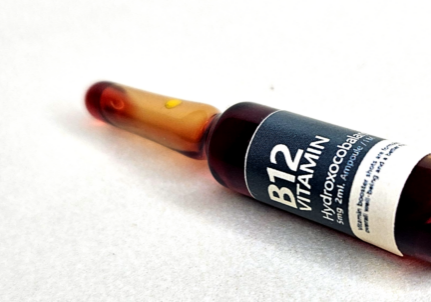RESOURCES: B12 Essentials

A Key Player in Collagen Synthesis and Skin Health
Vitamin B12, a crucial nutrient for various bodily functions, poses a unique challenge for some individuals who struggle to absorb it naturally. This article explores why people turn to B12 supplements, their benefits, and provides guidance on dosages for starting and ongoing consumption.
The Need for Vitamin B12 Supplementation
Vitamin B12 is essential for red blood cell formation, nerve function, and DNA synthesis. However, certain conditions, such as pernicious anemia, gastrointestinal surgeries, or specific genetic mutations, can impair the body's ability to absorb B12 from food. This is where supplementation comes in as a vital alternative.
Benefits of Vitamin B12 Tablets
- Preventing Anemia: B12 is crucial for preventing megaloblastic anemia, a condition that makes people tired and weak.
- Neurological Function: Adequate B12 levels are essential for nerve health and cognitive function.
- Mood Regulation: It plays a role in synthesizing and metabolizing serotonin, a chemical responsible for regulating mood.
Starting Dosages
For those beginning B12 supplementation, the recommended starting dose can vary. A typical initial dose might range from 500 to 1,000 micrograms daily, especially for those diagnosed with a deficiency. It's crucial to consult with healthcare professionals for personalized dosage based on individual health needs and absorption capacity.
Ongoing Dosage and Maintenance
After initial treatment, the ongoing dose often depends on the individual's response and specific health circumstances. Some may require a lower daily dose, while others might need periodic high-dose injections. Regular monitoring of B12 levels is recommended to adjust the dose as needed.
Forms of Vitamin B12 Supplements
Besides tablets, Vitamin B12 is available in forms like sublingual lozenges and injections. The choice depends on personal preference, absorption issues, and medical advice.
Key Considerations
- Dietary Sources: While supplementation is crucial for some, dietary sources of B12 should not be ignored. These include meat, fish, dairy, and fortified foods.
- Medical Advice: Always seek medical guidance for dosage, especially for those with existing health conditions.
- Regular Monitoring: Regular blood tests can help monitor B12 levels and adjust dosage accordingly.
--
Conclusion
Vitamin B12 supplementation is a critical health consideration for individuals who cannot absorb this nutrient naturally. With proper guidance on dosages and forms, supplements can effectively maintain healthy B12 levels, supporting overall well-being.

B12 Essentials
This article provides a concise yet comprehensive overview of Vitamin B12 supplementation, tailored for individuals unable to absorb it naturally. It highlights the benefits, initial and ongoing dosage advice, and the importance of medical consultation and monitoring.
